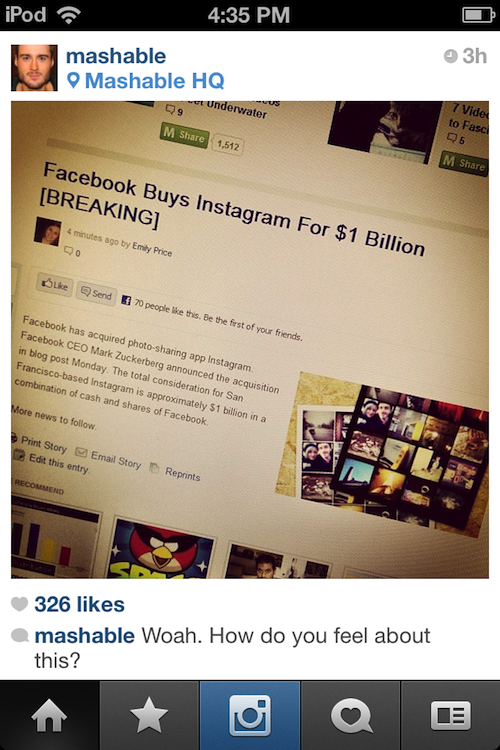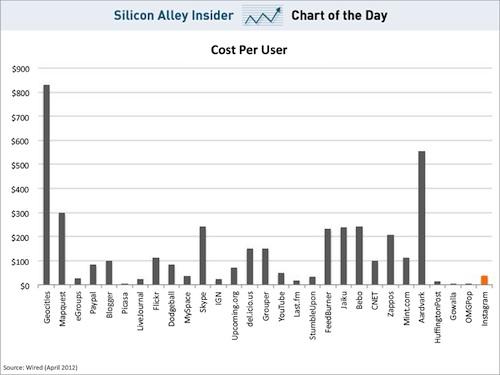
When word came down from Mark Zuckerberg that Facebook acquired Instagram, many people had immediate, strong, and diverse reactions. Some applauded Facebook for making a substantial purchase before its ever-looming IPO. Others decried the move as a shallow attempt for the company to buy some cool points and mystique, or simply take over one of its biggest competitors. Others still are concerned, as Instagram users, that their interactions with the app will be compromised now that Facebook is behind the metaphorical wheel.
As fans of mobile content creation (have you seen our latest mobile uploads collection?), we know the challenges that lie ahead. For one thing, Facebook’s history of acquisition is littered with shutdown startups like Gowalla and diminished communities like FriendFeed. For another, how will Facebook cope with Instagram content that’s not Facebook-friendly? Facebook hasn’t hesitated to censor (potentially) controversial content in the past. Will Instagram suddenly have additional standards for what content is questionable? The simple answer: we don’t know. So before rushing to a hasty judgement, we considered a plethora of possible outcomes. In doing so, the JESS3 team and I distilled these ideas down to three “If…” statements:
- If Facebook leaves Instagram alone, everybody wins. This is what we see as the most likely Facebook endgame. With Facebook capital to fuel Instagram, now seems like the perfect opportunity to expand and enhance Instagram’s features as its original creators see fit. This makes Instagram a more lucrative asset for Facebook while creating a better experience for users. And with Instagram logging a million downloads of its Android app in the 24 hours after its launch, the platform shows no signs of slowing down.
- If Facebook integrates Instagram elements into Facebook and leaves Instagram’s apps untouched, Facebook and Instagram benefit with only minor inconvenience to Facebook users. Facebook users are notoriously fickle about adjustments to the platform. This is not likely to change soon. But once users settle down and Instagram features become parts of the Facebook lexicon, Facebook could become more visually interesting and a bigger player in the battle for mobile usership.
- If Facebook tries to shoehorn Instagram’s culture and usership into Facebook, it will be disastrous. Facebook and Instagram function in fundamentally different ways and cultivate drastically different cultures. The key difference is content creation. Facebook users certainly share and comment on content. What they don’t do is create that content through the Facebook platform. The idea of Facebook inserting itself into the content creation game makes Instagram users (like me) a little bit nervous. In the announcement, Zuckerberg wrote, “We plan on keeping features like the ability to post to other social networks, the ability to not share your Instagrams on Facebook if you want, and the ability to have followers and follow people separately from your friends on Facebook.” Still, there’s grounds for concern that Twitter and other methods of sharing are at risk of being marginalized.
So, to reiterate, I have no idea what will come of this. No one does yet. But no matter what happens, one thing’s universally understood: this was a big move. Wired reports the billion-dollar sale nets CEO Kevin Systrom $400 million. Wall Street Journal Marketplace Editor, Dennis Berman, put the total sale in context when he tweeted:
Remember this day. 551-day-old Instagram is worth $1 billion. 116-year-old New York Times Co.: $967 million. — Dennis K. Berman (@dkberman) April 9, 2012
Andy Baio of Wired put together this chart, comparing Instagram’s ‘Cost Per User’ to that of other notable sites that have been acquired in the past 10 years.
If we look strictly at the acquisition cost per user, Facebook got a relative deal with the Instagram purchase, paying roughly $28 for each of Instagram’s 35 million users. (The median cost across all the acquisitions is about $92 per user.)
H/t Rachel Sklar for some of the links used here.
Tags: acquisition, facebook, Instagram

Join the Conversation